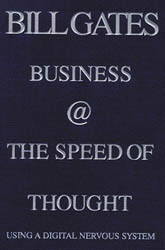Business @ the Speed of Thought
Business @ the Speed of Thought is a book written by Bill Gates, co-founder of Microsoft, in collaboration with Collins Hemingway in 1999. The book discusses how business and technology are integrated, and how digital infrastructure and the Internet can help businesses to think and operate at a new speed. Gates emphasizes the importance of information flow for competitiveness in the global marketplace.
Overview[edit | edit source]
Business @ the Speed of Thought uses Microsoft as a case study to demonstrate how a digital nervous system (a term coined by Gates to describe a digital infrastructure that allows for data flow to the right parts of an organization quickly) can improve the responsiveness of a business. Gates outlines principles for companies to follow to become more efficient, make better decisions, and develop the agility required to succeed in the 21st century. The book is divided into several sections, each focusing on different aspects of business operations, including management, customer service, and technology infrastructure.
Key Concepts[edit | edit source]
The book introduces several key concepts, including:
- Digital Nervous System: A digital infrastructure that allows for the free flow of information within an organization.
- Knowledge Management: The idea that an organization's most valuable resource is the knowledge of its people, and how technology can facilitate the sharing of that knowledge.
- E-commerce: The use of the Internet and digital information to conduct business, including buying and selling products and services.
- Business Agility: The ability of a business to respond quickly to changes in the market or environment by leveraging technology.
Impact[edit | edit source]
Business @ the Speed of Thought was notable for its foresight into the impact of technology on business. Gates predicted many trends that would become central to business strategy in the digital age, such as the importance of e-commerce, the role of data analytics in decision-making, and the need for businesses to adopt technology to remain competitive. The book has been used in academic and professional settings to teach principles of business management and information technology.
Criticism[edit | edit source]
While the book was praised for its insights into the future of technology and business, some critics argued that it was overly optimistic about the ease with which companies could integrate technology into their operations. Others felt that the book underestimated the challenges of managing privacy and security in a digital world.
Legacy[edit | edit source]
Despite the criticisms, Business @ the Speed of Thought has had a lasting impact on how businesses view technology. It has inspired leaders and managers to think more strategically about the use of information technology in their operations. The concepts introduced by Gates have become foundational to discussions about digital transformation and the role of IT in business strategy.
Search WikiMD
Ad.Tired of being Overweight? Try W8MD's physician weight loss program.
Semaglutide (Ozempic / Wegovy and Tirzepatide (Mounjaro / Zepbound) available.
Advertise on WikiMD
|
WikiMD's Wellness Encyclopedia |
| Let Food Be Thy Medicine Medicine Thy Food - Hippocrates |
Translate this page: - East Asian
中文,
日本,
한국어,
South Asian
हिन्दी,
தமிழ்,
తెలుగు,
Urdu,
ಕನ್ನಡ,
Southeast Asian
Indonesian,
Vietnamese,
Thai,
မြန်မာဘာသာ,
বাংলা
European
español,
Deutsch,
français,
Greek,
português do Brasil,
polski,
română,
русский,
Nederlands,
norsk,
svenska,
suomi,
Italian
Middle Eastern & African
عربى,
Turkish,
Persian,
Hebrew,
Afrikaans,
isiZulu,
Kiswahili,
Other
Bulgarian,
Hungarian,
Czech,
Swedish,
മലയാളം,
मराठी,
ਪੰਜਾਬੀ,
ગુજરાતી,
Portuguese,
Ukrainian
Medical Disclaimer: WikiMD is not a substitute for professional medical advice. The information on WikiMD is provided as an information resource only, may be incorrect, outdated or misleading, and is not to be used or relied on for any diagnostic or treatment purposes. Please consult your health care provider before making any healthcare decisions or for guidance about a specific medical condition. WikiMD expressly disclaims responsibility, and shall have no liability, for any damages, loss, injury, or liability whatsoever suffered as a result of your reliance on the information contained in this site. By visiting this site you agree to the foregoing terms and conditions, which may from time to time be changed or supplemented by WikiMD. If you do not agree to the foregoing terms and conditions, you should not enter or use this site. See full disclaimer.
Credits:Most images are courtesy of Wikimedia commons, and templates Wikipedia, licensed under CC BY SA or similar.
Contributors: Prab R. Tumpati, MD

